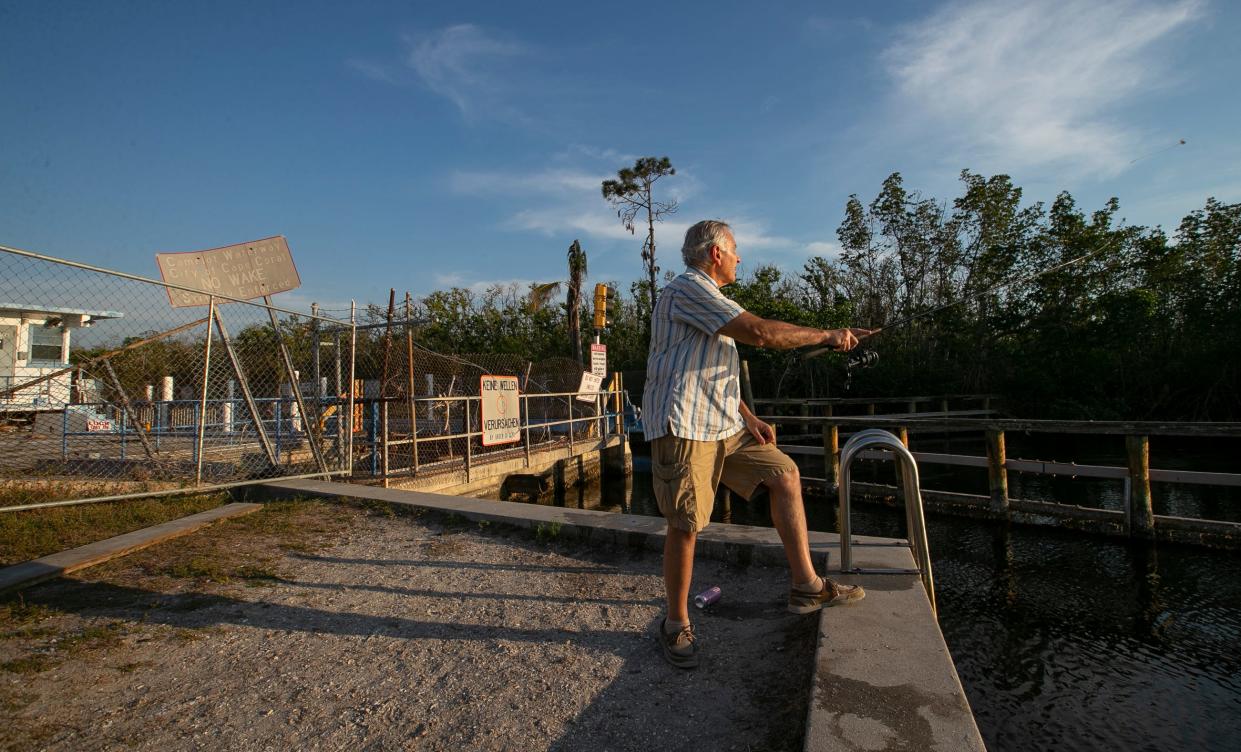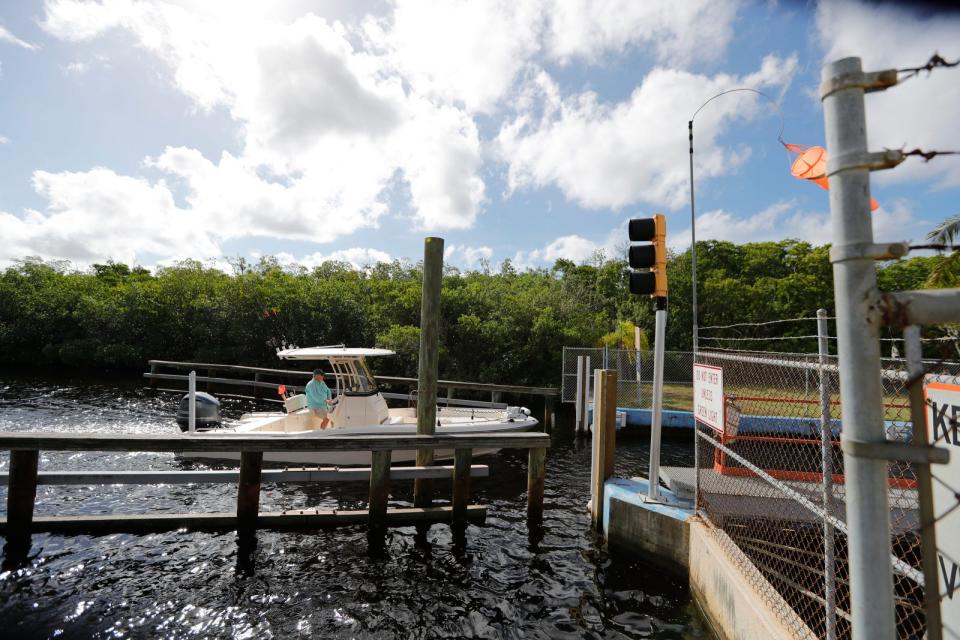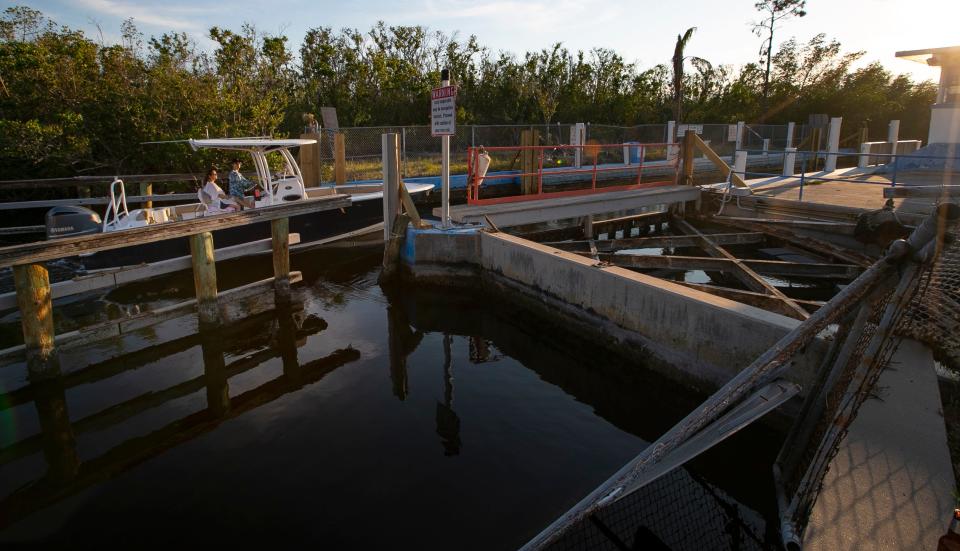Despite objection by Cape Coral, challenge to removal of Chiquita Boat Lock advances

After a startling dropout by several high-profile Southwest nonprofits, the challenge to keep Cape Coral's Chiquita Boat Lock, a nearly 50-year-old manmade barrier, in operation moves forward as the city's attempt to dismiss it based on timeliness fails.
According to documents filed on Oct. 31, Administrative Law Judge Suzanne Van Wyk ordered that the petition to challenge the removal was timely filed after holding an evidentiary hearing in late August and September.
How is each side responding?
When asked about the judge's decision to move forward, Cape Coral Spokesperson Kaitlyn Mullen said "The city does not comment on pending legal matters."
President of the Matlacha Civic Association Michael Hannon, who had challenged the removal in the past, said he expects the challenge to be successful.
Hannon said nothing has changed regarding the environmental threat removing the boat lock would have on the mangroves and the water in the Caloosahatche River.
"Now we'll finally get to have a hearing on the merits," Hannon said. "And we expect the outcome will be the same as last time despite the city spending hundreds of thousands and perhaps millions of dollars more than they did last time."
Support of the removal includes South Cape Coral residents, officials, and boaters who previously said that the city's new environmental plans sufficiently address environmental concerns.
They also argue that the boat lock has outlived its usefulness, causes unnecessary safety concerns to boaters, and is a hazard for manatees.
Ron Austin, a Cape Coral resident since 2012 and avid boater, said he and a group of residents are advocating for the removal of the lock based on a recent uptick in manatee deaths.
He said he wants what is good for the environment and the manatees.
"Everyone will see the information on both sides," Austin said. "The judge will make her decision based on all the scientific research and evidence and hopefully render her decision in the State and City's favor."
Previous coverage Nonprofits cite "intimidation" from Cape Coral over Chiquita Boat Lock
Related news Cape Coral's removal of the Chiquita Boat Lock faces challenges from barrier islands
Background to the removal
The boat lock provides Gulf of Mexico access from Camelot Canal and Southwest Spreader Waterway. Boaters must wait, sometimes 15 to 30 minutes, to pass through it.
Since 2018, the city of Cape Coral has been taking steps to remove the lock.
Its previous attempt met challenges from many of the same in opposition today as the city couldn't meet the requirement of the permit needed to remove the lock and prove that water quality standards would be met after its removal.
However, the setback didn't deter the city as it continued efforts to see the lock removed.
Cape Coral received a notice of intent issued by the Florida Department of Environmental Protection on Feb. 17 for the issuance of an environmental resource permit to remove the lock, after providing an environmental plan to address concerns about degrading water quality.
The boat lock has not been operational since being damaged by Hurricane Ian in 2022.

What was the legal issue?
The city filed a motion to dismiss the petition claiming the petition was not filed in time.
The current petitioners include Cape Coral residents Daniel Carney, James Collier, and Kevin Sparks, with Hannon acting as their "qualified representative."
Cape Coral published the notice of intent on March 3, which gave the petitioners 21 days to file their challenge.
However, Hannon, on behalf of the petitioners, which included several nonprofits at the time, requested an extension until May 24.
Despite objections from the city, the Florida Department of Environmental Protection granted the request to the petitioner but with the final date set for April 19.
Hannon filed their challenge on that last day, and the department forwarded it to the division of administrative hearing on May 8.
On June 2, Hannon filed to the group's "qualified representative."

Legal conclusion
In this instance, the respondents, the city and its lawyers, and the department and its lawyer, had to prove that the petitioners waived their right to file a challenge based on timeliness.
The city argued that the timeline should be based on when the petitioner's representative received the written notice of intent, according to the documents.
The respondents could not prove that the petitioners received the written notice of intent prior to its published date on March 3.
Cape Coral also argued that Hannon's request for an extension was invalid because he wasn't the petitioner's designated "qualified representative" at the time, according to the documents.
"The City cites section 120.569(1)(e) which requires that “all pleadings, motions, or other papers filed in a proceeding must be signed by the party, the party’s attorney, or the party’s qualified representative," the documents state.
However, Cape Coral did not cite any caselaw or precedent that the judge could rely on in making this decision.
"While Mr. Hannon had not met personally with any of the Petitioners prior to seeking the enlargement of time, he had knowledge of their interest in challenging the ERP from third parties," the documents state. "Without clear precedent on this issue, and given that waiver is disfavored in the law, the undersigned is loath to dismiss the Petition on that basis."
Lastly, the city argued that the extension was invalid because it was "not based on good cause and that excusable neglect for late filing was not established."
Again, the judge did not find the argument sufficient.
"Neither of these grounds were included in the Prehearing Stipulation nor were they tried by consent," the documents state. "As such, these arguments have been waived, and are beyond the undersigned’s jurisdiction."
What's next?
The case will be heard before Van Wyk between Nov. 29- Dec.1, and Dec. 4-7 in Fort Myers.
Luis Zambrano is a Watchdog/Cape Coral reporter for The News-Press and the Naples Daily News. You can reach Luis at Lzambrano@gannett.com. Follow him on Twitter @Lz2official.
This article originally appeared on Fort Myers News-Press: Will Cape Coral's Chiquita Boat Lock be removed? Hearing in November.

